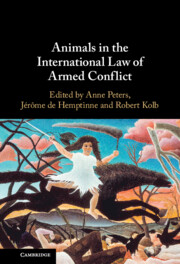Book contents
- Animals in the International Law of Armed Conflict
- Animals in the International Law of Armed Conflict
- Copyright page
- Contents
- Contributors
- Forewords
- Acknowledgements
- Abbreviations
- Part I The Need for Protecting Animals in Wartime
- Part II The Protection of Animals in International and Non-international Armed Conflicts
- 5 Animals as Property and as Objects
- 6 Animals as Specially Protected Objects
- 7 Animals as Part of the Environment
- 8 Animals as Endangered Species
- 9 Animals as War Weapons
- 10 Animals as Combatants and as Prisoners of War?
- 11 Animals as Means of Medical Transportation, Search and Rescue
- 12 Veterinary Personnel
- Part III The Protection of Animals in Specific Situations
- Part IV Enforcement Regimes for the Protection of Animals in Wartime
- Part V Towards Better Protection of Animals in Wartime
- Index
- References
8 - Animals as Endangered Species
from Part II - The Protection of Animals in International and Non-international Armed Conflicts
Published online by Cambridge University Press: 06 October 2022
- Animals in the International Law of Armed Conflict
- Animals in the International Law of Armed Conflict
- Copyright page
- Contents
- Contributors
- Forewords
- Acknowledgements
- Abbreviations
- Part I The Need for Protecting Animals in Wartime
- Part II The Protection of Animals in International and Non-international Armed Conflicts
- 5 Animals as Property and as Objects
- 6 Animals as Specially Protected Objects
- 7 Animals as Part of the Environment
- 8 Animals as Endangered Species
- 9 Animals as War Weapons
- 10 Animals as Combatants and as Prisoners of War?
- 11 Animals as Means of Medical Transportation, Search and Rescue
- 12 Veterinary Personnel
- Part III The Protection of Animals in Specific Situations
- Part IV Enforcement Regimes for the Protection of Animals in Wartime
- Part V Towards Better Protection of Animals in Wartime
- Index
- References
Summary
This chapter addresses the relevance of the peacetime qualification of some groups of animals as ‘endangered species’ in situations of armed conflict, both international and non-international. The chapter first gives an overview of the lex lata on endangered animal species in international environmental law. It discusses a number of options to enhance the protection of ‘endangered species’ in situations of armed conflict. By way of interpretation and by way of analogy, the rationale of peacetime protection of ‘endangered species’ can be integrated into international humanitarian law. The chapter finally argues that the protection of ‘endangered species’ in situations of armed conflict can be improved by a protection similar to specially protected objects such as cultural objects and livestock.
Keywords
- Type
- Chapter
- Information
- Animals in the International Law of Armed Conflict , pp. 129 - 149Publisher: Cambridge University PressPrint publication year: 2022

